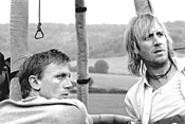Of course, a closer look at the title reveals something amiss, especially as it comes from the novel of the same name, by Ian McEwan, a man who knows what words mean. For as the Bush administration discovered, when it attempted to name the invasion of Iraq "Operation Enduring Freedom," to "endure" is not merely to last but to undergo, to suffer. (The Latin root means "to make hard.") "Enduring love" can refer to love that lasts, as it does in this film, or to the act of suffering in love -- and from love -- which it also does in this film. In fact, the movie begins in suffering, middles in suffering, and ends in still greater suffering; the protagonist endures it all and is not hardened, but softened, renewed, like a knife both forged and cleansed by fire. But only at the very end -- the very, very end -- by which time you may have turned against him or the movie, or both.
The film opens in a vision of Arcadia, a pastoral setting of luscious green hills. Joe (the craggily beautiful Daniel Craig) has taken girlfriend Claire (Samantha Morton) out for a picnic. But before the two can pop the cork on the champagne, a hot-air balloon skitters across the field, attempting to land. A boy is trapped inside, alone and unable to get to the ground. Joe runs to help, as do several other men, who appear from the road or other parts of the field. The men grasp the basket and pull it to the ground, but a gust of wind sends the balloon back into the air, and as it ascends, they must let go to survive. One of them doesn't, and he falls from the sky to a messy death.
It's wise to enjoy the incredible light and color in this scene -- green grass, blue sky, candy-apple-red balloon -- because it's the last time you'll see anything like it. The following scene, at a candlelit dinner party, occurs mostly in shadow, and the rest of the film is a study in gray, if not black. The life has gone out of Joe, who is haunted by the event to the point of obsession, and the film reflects his narrowing of vision. He sketches balloons, blows up balloons, sees balloons in pottery, sculpture, apples. He can't stop believing that if all the men had held on, as that one man had, they could have brought down the balloon. (He worries that he was the first to let go, as it seems he was.) And then, as if his own trauma were not enough, it's compounded by the arrival of Jed (Rhys Ifans).
Jed is a scraggly man, droopy in oversized clothing, with drippy eyes and the softness of the deeply religious (and/or the criminally insane). He, too, was in the field that day; after he and Joe found the mangled body of the dead man, Jed invited Joe to pray. Now Jed believes that he and Joe shared an experience worth talking about, and he isn't willing to let it go, though Joe has no interest. No matter how many times Joe tries to tell him to get lost, Jed keeps showing up, intent on making some kind of connection. What kind of connection is exactly what Joe can't determine -- and neither can we, until it becomes all too clear.
The movie has its moments. Samantha Morton, morose and raccoon-eyed with heavy mascara, plays a feeling woman whose initial attempts to support her unraveling partner only widen the rift between them. The dialogue between the two is clipped and smart; they are real, interesting characters -- she more than he. (Joe's problem, at least initially, is an overdose of rationality, and that's always limiting.) The movie offers a picture of a good marriage, in the couple's friends Robin (Bill Nighy) and Rachel (Susan Lynch), which is worth seeing. There is effective camerawork, especially toward the beginning, where we feel ourselves lifting off and floating into the sky in a dizzying fervor.
But the thing is overproduced. For one thing, there is too much music, and it's too loud; occasionally, it nearly drowns out the dialogue. Also, the direction is manipulative. The film wants to know more than the audience; it wants to come from behind and surprise in a way that feels punishing, as though we're being taught a bitter lesson. The result is creepy and unpleasant. There is hope, however bleak, at the end -- it's the Ian McEwan kind of hope, where nearly everything has been lost anyway -- but mostly there's a sense of unnecessary devastation. No thanks.


